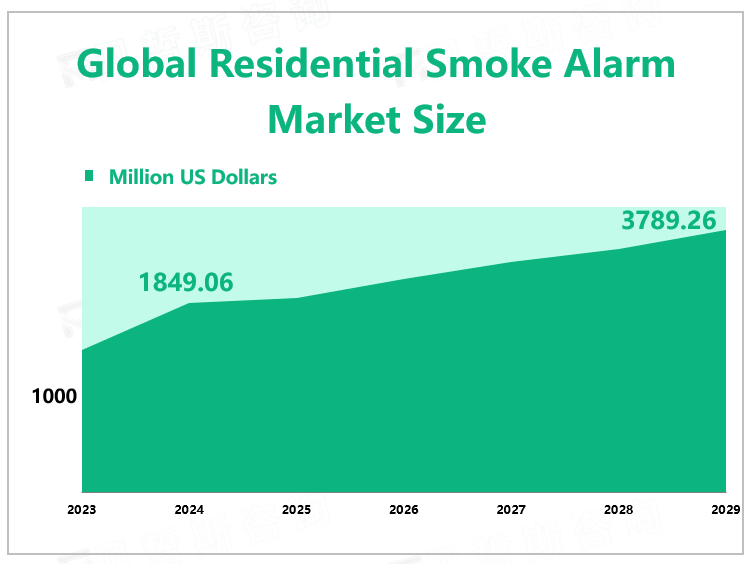Global Residential Smoke Alarm Market Overview
According to Global Market Monitor, the global residential smoke alarm market size will reach $1849.06 million in 2024 and is expected to grow to $3789.26 million by 2029.
Designed to identify a fire during the smoldering or fire stage, these detectors can sense a fire based on the type, density, and volume of smoke produced during a fire incident. In addition, the strict standards imposed by the government on commercial, residential, and industrial buildings are forcing construction suppliers to make projects comply with fire and safety codes, thus further driving the growth of the smoke detector market.
Market Trend
One of the major drivers of the global smoke detector market is the advantages of smart smoke detectors over conventional smoke detectors. Compared with traditional smoke detectors, smart smoke detectors are relatively more efficient in providing functions, expanding the size of the smoke detector market. One of the most emerging trends in the smoke detector market is the convergence of smartphones. Smoke detectors connected to smartphones are convenient because they can be easily disabled and work well anywhere in the home where steam or cooking fumes are likely to be generated, such as near the kitchen or bathroom.

Regional Market
Photoelectric and ionizing smoke detectors are widely used in residential properties. In residential environments, photoelectric alarms are more responsive to smoldering fires, while ionization detectors are more suitable for burning fires.
With the increasing concern for home safety, the use of smoke and fire detectors is increasing. Developed countries such as the United States, Canada, and Japan have modified their standardized building standards and regulations to allow the installation of home smoke detection systems, thus boosting the market. In addition, fire services in the UK have increased over the past few years. All residential units and commercial buildings in Canada must meet the standards of several national regulatory codes, including the National Fire Code (NFC), the National Building Code (NBC), and provincial codes. As the global smart home trend expands, so does the demand for smoke and fire detectors. Due to the increase in disposable income, the penetration rate of smoke alarms in China has increased. At the same time, in terms of building fire safety, the Chinese government has developed stronger laws and guidelines. The need to install smoke alarms in residential and commercial buildings has increased the smoke alarm industry.
|
By Type |
Photoelectric Smoke Alarm |
|
Ionization Smoke Alarm |
|
|
Dual Sensor Smoke Detector |
|
|
The photoelectric smoke alarm segment dominates the market. |
|
|
By Application |
Home Smoke Alarm |
|
Public Places Smoke Alarm |
|
|
Public places smoke alarm occupies the major market. |
We provide more professional and intelligent market reports to complement your business decisions.